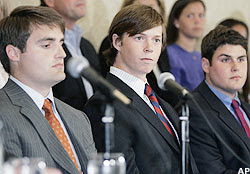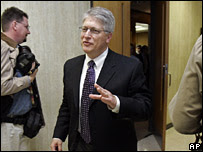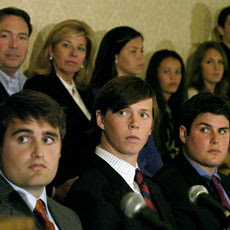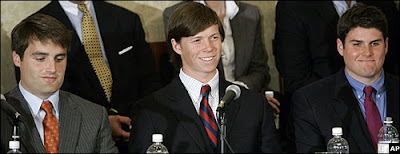
In an attempt at irony, I have often said "growing up" is the day the child realizes that no one else ever did.
The world is full of adults still driven by their childish motives and emotions.

We have long expressed a child's formal learning needs as the three R's, reading, 'riting, and 'rithmetic which includes a little joke about the need to add spelling to the 'riting part. The three R's of adulthood should be rights, responsibilities and repercussions. Too often, we think the right's are confirmed automatically when we reach legal age, and grudgingly accept a vague notion of responsibility, and then suppress any further thoughts about repercussions. So much of our social order would be improved, if we were to analyze situations giving equal attention to all three. In some areas, we already fully integrate this idea, such as our traffic laws, in which the right to drive is firmly tied to our obeying traffic laws, and failure to do so has repercussions if we get caught or worse cause injury.

For example: some parents claim the right to keep their children out of sex education, or diversity sensitivity programs. All they need to do is sign a form, and their kids are kept from being exposed to this sort of knowledge and social awareness, end of story.

Is that nuts or what?


I can understand that these parents think they are protecting their children from influences that conflict with their religious beliefs, but who bears responsibility if one of their kids gets a venereal disease, or pregnant, or acts cruelly or violently towards a minority class mate? The claim of that right, has repercussions on their children, and maybe on other people's children, but what are the repercussions for the parent? Shouldn't the legal form signed by a parent include the parent's acceptance of full responsibility for any trouble their child gets into as a result, and shouldn't that carry with it civil and criminal consequences for the parent? As it is, the parent wants the right, but leaves the kid to suffer the consequences, when in fact they are guilty of child neglect, abuse and even endangerment.

Example: some talk show hosts claim "free speech" as a right when they are being broadcast in the employ of a broadcast license owner, which they think empowers them to say whatever they want without responsibility or repercussions for statements that would probably bring them a bloody nose or worse on the street. If I had to justify something I said by saying that it's no different from what hip-hop or rap artists say, then it's clear I've really messed up. How is that different from justifying my speech because I heard a character in a movie say it? Ludicrous!

The Fox network has built an audience base by pandering to a malevolent streak that claims all sorts of rights to say or advocate extremist views, without any sense that the public forum has a responsibility to truth, fairness and circumspect analysis. They take a policy of bias and extreme partisanship and constantly blare out the words "fair and balanced." Tragically too many accept the hype as true.

They take the phrase "suicide bomber" and change it to "homicide bomber" to advance a political idea that the perpetrator is a coward. I bet nobody at Fox has the guts to do the same if we were under occupation by a foreign power. A suicide bomber's intent is homicide and that phrase includes that concept. As a result of this nonsense at Fox, we are led to believe that the bomber did not die in the act, which means a cowardly act, but this is an out and out lie and distortion. We once had a fairness doctrine which protected free speech on licensed broadcast by insisting equal time be presented to opposing political views.

Thank you Reaganites for this 1984ish change in our affairs of state. I know you want a one party system run by an elite oligarchy but there are lots of others of us who are not going to let us go there.

Example: a woman brings false charges of rape against three Duke LaCrosse players Reade Seligmann, Dave Evans and Collin Finnerty,

and she is championed by Mike Nifong, a sociopathic prosecutor who can't stop grinning

over the nightmare he brought upon these three innocent men. Now that all charges have been dismissed by the state's attorney general Roy Cooper, and he has taken the heroic step of declaring their innocence in a public press conference,

we are left to ask who is responsible for the extreme harm to the lives of these men, families and friends.Women's rights groups, and African American rights groups exercised their right of free speech to mount major public demonstrations against the three. Where in all this did anyone take a moment to determine their responsibilities, and contemplate the repercussions should they happen to be wrong? These guys did everything right because they reacted to the charges in a responsible way, the prosecutor did everything wrong because

he reacted irresponsibility, and the accuser is apparently simply looney and thus not responsible for anything. Nifong is the one who should have recognized crazed accusations and protected them from her. It is the height of lame back stepping to point out that they participated in a party where booze flowed and strippers were hired, and that one of them had a brush with the law over a different kind of assault. None of that justifies what happened to these guys, except in the eyes of the most hypocritical religious right.


Example: parents have used charges of child molestation in custody battles, and if the accused is the father, it can be very hard to refute this in court. The right to have your day in court, is supposed to carry the responsibility to speak truthfully and aid the discovery of justice, but the repercussion of penalty repercussion of a criminal perjury charge hardly seems sufficient to right the harm done to the wrongly accused. We all want to protect the children,

but we also must act responsibly to the accused, so the innocent do not have irreparable harm done to their reputation and peace of mind.
Proposed: if someone knowingly accuses another person falsely, that accuser should suffer the same penalty that would have befallen the accused.

 I've only been on MySpace a few months so I'm still discovering what it is. Because of my varied interests, I get add requests from total strangers. That's terrific. I've also sought friends with interests of mine, and now enjoy the dialogue with them.
I've only been on MySpace a few months so I'm still discovering what it is. Because of my varied interests, I get add requests from total strangers. That's terrific. I've also sought friends with interests of mine, and now enjoy the dialogue with them. 
 My problem is offensive content in the friend requests.
My problem is offensive content in the friend requests. The other kind of add request I hate are those that appear to be from underage young people. I am often approached because of my interests and that includes my actual daily life as well as my virtual life, and I'm happy to share what I know. The problem is that the add request may actually be a law enforcement officer hoping to catch a child predator. I don't know whether this has happened to me, but I suspect that I received a few. Yes, yes, yes we must protect children from predators, but must this be at the expense of my comfort and enjoyment in visiting the world through MySpace? I don't like that kind of crap, and I don't want to see or read that garbage regardless of who is actually sending it.
The other kind of add request I hate are those that appear to be from underage young people. I am often approached because of my interests and that includes my actual daily life as well as my virtual life, and I'm happy to share what I know. The problem is that the add request may actually be a law enforcement officer hoping to catch a child predator. I don't know whether this has happened to me, but I suspect that I received a few. Yes, yes, yes we must protect children from predators, but must this be at the expense of my comfort and enjoyment in visiting the world through MySpace? I don't like that kind of crap, and I don't want to see or read that garbage regardless of who is actually sending it. First, law enforcement should be strongly encouraged to refine their search technique to seek out only those who are actual predators and leave the rest of us alone. Regardless of what the Patriot Act says, our Constitution forbids unwarranted searches. At the same time the constitution gives law enforcement every right to enforce our laws. There is deep wisdom in our constitutional legal system which was created to avoid the abuses and excesses of the countries from which we came.
First, law enforcement should be strongly encouraged to refine their search technique to seek out only those who are actual predators and leave the rest of us alone. Regardless of what the Patriot Act says, our Constitution forbids unwarranted searches. At the same time the constitution gives law enforcement every right to enforce our laws. There is deep wisdom in our constitutional legal system which was created to avoid the abuses and excesses of the countries from which we came.  Second, since your MySpace software is constantly evolving, please consider an additional message channel that provides a parental-like buffering so that I can avoid denying anyone's request who legitimately wants to share interests with me? Perhaps messages on this channel would include a notice and an agreement by the user that the messages be available for public viewing, thus watchdogs could spot illegal chat. Perhaps it could work so that not only could the young person make a request in safety, but when we get queried to approve a request it can be a referral to use this additional message system. I think this is a much better way to deal with this real problem, than offending and disturbing me.
Second, since your MySpace software is constantly evolving, please consider an additional message channel that provides a parental-like buffering so that I can avoid denying anyone's request who legitimately wants to share interests with me? Perhaps messages on this channel would include a notice and an agreement by the user that the messages be available for public viewing, thus watchdogs could spot illegal chat. Perhaps it could work so that not only could the young person make a request in safety, but when we get queried to approve a request it can be a referral to use this additional message system. I think this is a much better way to deal with this real problem, than offending and disturbing me. 
















































